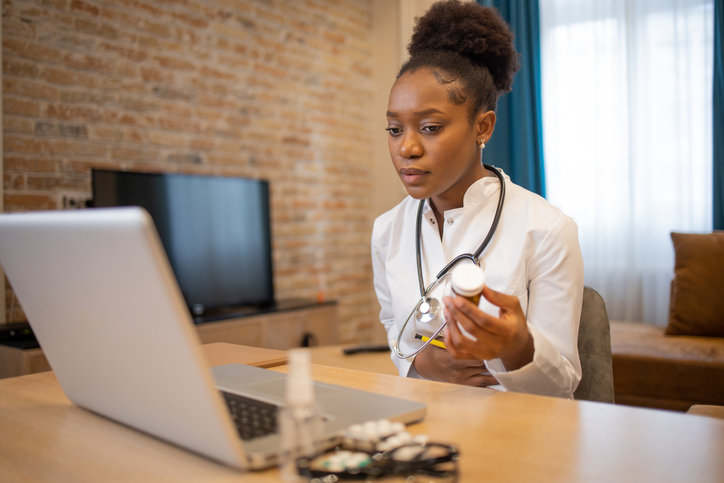
Source: Lordn / Getty
The number of Black female physicians remains alarmingly low in the United States, but the few who have taken their place in the medical field are making a major impact.
Earlier this year, Tamia Potter became the first Black female admitted to Vanderbilt University’s highly respected neurosurgery residency program. The program has existed for 91 years. While the hopeful resident is excited about her achievement, the story underpins the fact that the medical field has barely budged in including Black women for nearly 100 years.
Technically, the U.S. has had Black female doctors since 1864, when Dr. Rebecca Lee Crumpler became the first African American woman to earn an M.D. degree. However, racial and gender diversity growth in the medical field has stagnated. The percentage of Black women in medicine was barely over zero until the 1960s. Between 1940 and 2018, there was only a 0.1 percent increase. Discrimination is at the core of this issue, as is seen in the following stories from women in medicine.

Source: MixMedia / Getty
Jasmine Brown
Jasmine Brown, a third-year medical student at the University of Pennsylvania, has experienced countless incidents of racism and sexism during her studies. These experiences compelled Brown to pen her book Twice As Hard: The Stories Of Black Women Who Fought To Become Physicians, From The Civil War To The 21st Century.
The book, the UPenn Pupil, chronicles the journeys of Black female physicians who came before her in the hopes of making up for the lack of role models who look like her. Brown noted a common theme among what kept each of the women she studied going in the face of discrimination: building something better for the next generation.
The author connects to that sentiment of giving back. When The San Diego Voice & Viewpoint asked what motivates her, she said, “My book and other advocacy work that I’ve done…I’m working to reduce the number of racist and sexist encounters that people face in medicine. Helping others in that way gives me a lot of joy and helps me to heal from the difficult experiences I’ve had along my journey.”
Dr. Sharon Brangman
Dr. Sharon Brangman, a doctor who works in geriatrics medicine at Upstate Medical University in Syracuse, New York, shared her upsetting experiences of sexism and racism when she was in school with NPR. The Alzheimer’s expert recalls a white teacher who was wildly inappropriate, using what she called “Black dialect” when speaking about images of Black people and using Playboy spreads to discuss female anatomy.
Dr. Brangman is part of a multi-generational line of women in medicine. Her mother, Ruby Brangman, was one of the first Black women nurse practitioners in New York. Her daughter, Dr. Jenna Lester, is a dermatologist. Sharon recognizes how her mother paved the way for her, stating, “To realize all the things that you [Ruby] had to go through and that Grandma had to go through to get me to where I am today…I feel like I’m working for a little bit more than just myself.”

Source: Rockaa / Getty
Dr. Jasmine Marcelin
Paying it forward is a driving force for other women in medicine, too. Dr. Jasmine Marcelin is an infectious disease physician at the University of Nebraska Medical Center. Growing up in the Caribbean, Dr. Marcelin brings a unique perspective to her experiences in the U.S. medical system.
The specialist explained to SheMD that she grew up with plenty of successful Black women, including doctors, around her. The feeling of being “the only one” didn’t happen for her until she moved to the U.S. Then, the confidence and go-getter attitude praised where she grew up was suddenly reframed “bossy” and “arrogant.” She found herself making herself smaller and quieter for the comfort of others.
One day, Dr. Marcelin realized she wanted to help create space for other women who looked like her in her field, and she co-founded the Trainee Diversity and Inclusion Committee, which advocates for inclusion in her specialty.
When asked what advice she has for upcoming physicians, the advocate said, “Speak up! You may not be able to fix the problem of being ‘the only’ [Black woman] right away, but the only way they will be able to her you is if you speak up.”









